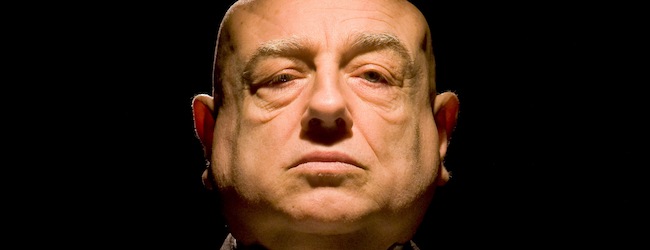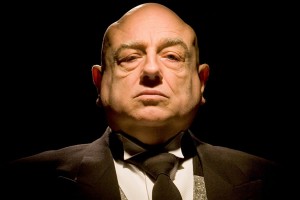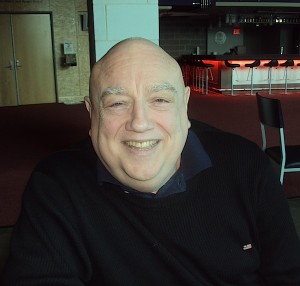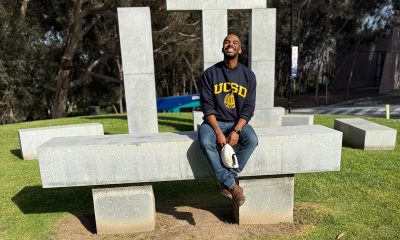Theater
Reprising Max
Gay actor Ed Dixon draws raves for ‘Sunset’ performance


Actor Ed Dixon as Max in Signature Theatre’s current production ‘Sunset Boulevard.’ (Production photo by Chris Mueller, courtesy of Signature)
Ed Dixon’s emotional pendulum — as one might expect from an actor — swings wide.
During an hour-long interview in the lobby of Signature Theatre where he’s on the boards each night as Max in “Sunset Boulevard,” Dixon laughs uproariously and heartily several times recanting tales and dropping names from his four-decade career. And though no tears appear, two of the stories he tells involve copious sheddings thereof.
One even came during “Sunset,” though it was during his initial encounter with the musical 14 years ago when he toured with it for a year with Linda Balgord as Norma.
“In the movie it cuts away from (Max) all the time, but on the stage he’s up there a lot of time in the background just suffering,” Dixon says. “At the end of act one there was a part where I stand behind a fringe curtain at the part where Norma pulls Joe down on top of her and I would just release the curtain down on my face. Well after standing there for six months or whatever it was in that condition, feeling this wretched, painful condition, it’s like your body doesn’t know you’re only kidding. It’s like you’re really experiencing that. This one night I just started crying and cried all during intermission. People were going, ‘Are you OK? I was like, ‘Uhh, not really.’ It had really built up over the run. So how do you deal with that every day for a year? It makes you kind of crazy.”
This production, which runs through Feb. 13 and has been the second-biggest hit in Signature’s 21-year history (after “Les Miserables”), hasn’t been as emotionally draining, Dixon says. But it has been taxing. Returning to the role has been rewarding and challenging, he says.
The lessons Dixon, 62, uses to coach actors and singers for auditions in New York, where he lives on the Upper West Side, have come in handy.
“It feels different doing eight shows a week than it did 14 years ago. I was really vocally stronger 14 years ago but I’ve also been very pleased to see how much agility I still have. … I went into daily training months ago.”
It’s the most vocally challenging part Dixon — who has extensive opera and musical theater credits — has done in years.
The Anadarko, Okla., native and son of a Church of Christ revival minister, knew early on he liked boys, even before he had the language to articulate it. Asked at church as a pre-schooler whom he would someday marry, he matter-of-factly answered Jimmy DeLong, a boy from his neighborhood.
“They said, ‘You can’t marry a boy.’ I said, ‘Why not?’ I remember that, but I didn’t know that I was gay. I just knew I liked Jimmy DeLong.”
Later, he had no idea what taunts (“Hey, queer ass!”) in middle school meant.
He arrived in New York (“Oklahoma is a wretched place,” he says) in the late ’60s and never looked back. Never even to visit his parents, from whom he was estranged and only saw twice in adulthood.
His big break came in the chorus of “No No Nannette,” a popular musical revival in 1970. Even though New York, and especially the theater world, was filled with gays at the time, it wasn’t an especially gay-friendly environment.
“Things were so different then you can’t even imagine it,” he says. “Even in the theater, you didn’t really talk overtly about it. And I was even more behind the times because I was coming from the Dark Ages. I remember in the dressing room of ‘No, No Nannette,’ there was an old queen who only spoke to us in the voice of Bette Davis and used to scare the fuck out of me. I was just like, ‘Oh god, please don’t let me end up like that, you know?’”
Even as recent as his first run with the touring version of “Sunset,” a role he’d eyed since it debuted in London in 1993, there were hints of homophobia in the casting process for the straight part. He knew everyone in the room and was chatting them up between readings. Before the callback, he was tipped off to tone it down.
“I’d had a big career by then,” he says. “One night at a party one of them pulled me aside and said, ‘They really want to know that you were married to her.’ I thought, ‘Are you kidding?’ I’d just been laughing and joking and being myself, you know, before and after I read. So I stayed Max through the whole callback and got it.”
This run, Dixon says, has been draining but creatively satisfying. He and co-star Florence Lacey have worked together several times before and enjoy a special camaraderie.
“We’re like an old married couple,” he says. “You know, I always go spend time with her in her dressing room before the show. She always tells me she loves me. She calls me Daddy and I call her Baby. It’s really sweet. She’s just one of those people who’s so sweet you think, ‘Is that real?” And with her it’s totally real.”
The feelings are mutual.
“Speaking about Ed Dixon, I’m always a gushing mess,” Lacey says. “Ed is a man of extraordinary talent with a big voice and a heart to match. He has a laugh that makes the whole world join in and he can break your heart with a look. He’s tough and sensitive both as an artist and in his friendships. I feel proud to call him my dear, dear friend.”
He’s worked non-stop since he came to New York except for a stint in rehab in the ’80s when he beat a cocaine addiction. Dixon just celebrated 20 years of sobriety.
After “Sunset” ends its run, Dixon will tour with the musical “Curtains.” And a comedy he wrote called “Scenery,” which explores the inside tract of a showbiz Lunt/Fontanne-esque couple in which the husband is gay, is getting rave reviews in Cleveland where it just opened.
Dixon says a life-defining moment came watching his mentor, the character actor George Rose, from whom he learned much about acting and life.
“He was middle aged, this gay, effete, Englishman, and he came into the room and he was just the most powerful man I had ever been in the presence of. That was a big moment for me. Because of him I realized, ‘Oh, you can be gay and still powerful.’ I didn’t know that before.”
Theater
Magic is happening for Round House’s out stage manager
Carrie Edick talks long hours, intricacies of ‘Nothing Up My Sleeve’

‘Nothing Up My Sleeve’
Through March 15
Round House Theatre
4545 East-West Highway
Bethesda, Md. 20814
Tickets start at $50
Roundhousetheatre.org
Magic is happening for out stage manager Carrie Edick.
Working on Round House Theatre’s production of “Nothing Up My Sleeve,” Edick quickly learned the ways of magicians, their tricks, and all about the code of honor among those who are privy to their secrets.
The trick-filled, one-man show starring master illusionist Dendy and staged by celebrated director Aaron Posner, is part exciting magic act and part deeply personal journey. The new work promises “captivating storytelling, audience interaction, jaw-dropping tricks, and mind-bending surprises.”
Early in rehearsals, there was talk of signing a non-disclosure agreement (NDA) for production assistants. It didn’t happen, and it wasn’t necessary, explains Edick, 26. “By not having an NDA, Dendy shows a lot of trust in us, and that makes me want to keep the secrets even more.
“Magic is Dendy’s livelihood. He’s sharing a lot and trusting a lot; in return we do the best we can to support him and a large part of that includes keeping his secrets.”
As a production assistant (think assistant stage manager), Edick strives to make things move as smoothly as possible. While she acknowledges perfection is impossible and theater is about storytelling, her pursuit of exactness involves countless checklists and triple checks, again and again. Six day weeks and long hours are common. Stage managers are the first to arrive and last to leave.
This season has been a lot about learning, adds Edick. With “The Inheritance” at Round House (a 22-week long contract), she learned how to do a show in rep which meant changing from Part One to Part Two very quickly; “In Clay” at Signature Theatre introduced her to pottery; and now with “Nothing Up My Sleeve,” she’s undergoing a crash course in magic.
She compares her career to a never-ending education: “Stage managers possess a broad skillset and that makes us that much more malleable and ready to attack the next project. With some productions it hurts my heart a little bit to let it go, but usually I’m ready for something new.”
For Edick, theater is community. (Growing up in Maryland, she was a shy kid whose parents signed her up for theater classes.) Now that community is the DMV theater scene and she considers Round House her artistic home. It’s where she works in different capacities, and it’s the venue in which she and actor/playwright Olivia Luzquinos chose to be married in 2024.
Edick came out in middle school around the time of her bat mitzvah. It’s also around the same time she began stage managing. Throughout high school she was the resident stage manager for student productions, and also successfully participated in county and statewide stage management competitions which led to a scholarship at the University of Maryland, Baltimore County (UMBC) where she focused on technical theater studies.
Edick has always been clear about what she wants. At an early age she mapped out a theater trajectory. Her first professional gig was “Tuesdays with Morrie” at Theatre J in 2021. She’s worked consistently ever since.
Stage managing pays the bills but her resume also includes directing and intimacy choreography (a creative and technical process for creating physical and emotional intimacy on stage). She names Pulitzer Prize winning lesbian playwright Paula Vogel among her favorite artists, and places intimacy choreographing Vogel’s “How I learned to Drive” high on the artistic bucket list.
“To me that play is heightened art that has to do with a lot of triggering content that can be made very beautiful while being built to make you feel uncomfortable; it’s what I love about theater.”
For now, “Nothing Up My Sleeve” keeps Edick more than busy: “For one magic trick, we have to set up 100 needles.”
Ultimately, she says “For stage managers, the show should stay the same each night. What changes are audiences and the energy they bring.”
Theater
‘Octet’ explores the depths of digital addiction
Habits not easily shaken in Studio Theatre chamber musical

‘Octet’
Through Feb. 26
Studio Theatre
1501 14th Street, N.W.
Tickets start at $55
Studiotheatre.org
David Malloy’s “Octet” delves deep into the depths of digital addiction.
Featuring a person ensemble, this extraordinary a capella chamber musical explores the lives of recovering internet addicts whose lives have been devastated by digital dependency; sharing what’s happened and how things have changed.
Dressed in casual street clothes, the “Friends of Saul” trickle into a church all-purpose room, check their cell phones in a basket, put away the bingo tables, and arrange folding chairs into a circle. Some may stop by a side table offering cookies, tea, and coffee before taking a seat.
The show opens with “The Forest,” a haunting hymn harking back to the good old days of an analog existence before glowing screens, incessant pings and texts.
“The forest was beautiful/ My head was clean and clear/Alone without fear/ The forest was safe/ I danced like a beautiful fool / One time some time.”
Mimicking an actual step meeting, there’s a preamble. And then the honest sharing begins, complete with accounts of sober time and slips.
Eager to share, Jessica (Chelsea Williams) painfully recalls being cancelled after the video of her public meltdown went viral. Henry (Angelo Harrington II) is a gay gamer with a Candy Crush problem. Toby (Adrian Joyce) a nihilist who needs to stay off the internet sings “So anyway/ I’m doing good/ Mostly/ Limiting my time/ Mostly.”
The group’s unseen founder Saul is absent, per usual.
In his stead Paula, a welcoming woman played with quiet compassion by Tracy Lynn Olivera, leads. She and her husband no longer connect. They bring screens to bed. In a love-lost ballad, she explains: “We don’t sleep well/ My husband I/ Our circadian rhythms corrupted/ By the sallow blue glow of a screen/ Sucking souls and melatonin/ All of my dreams have been stolen.”
After too much time spent arguing with strangers on the internet, Marvin, a brainy young father played by David Toshiro Crane, encounters the voice of a God.
Ed (Jimmy Kieffer) deals with a porn addiction. Karly (Ana Marcu) avoids dating apps, a compulsion compared to her mother’s addiction to slot machines.
Malloy, who not only wrote the music but also the smart lyrics, book, and inventive vocal arrangements, brilliantly joins isolation with live harmony. It’s really something.
And helmed by David Muse, “Octet” is a precisely, quietly, yet powerfully staged production, featuring a topnotch cast who (when not taking their moment in the spotlight) use their voices to make sounds and act as a sort of Greek chorus. Mostly on stage throughout all of the 100-minute one act, they demonstrate impressive stamina and concentration.
An immersive production, “Octet” invites audience members to feel a part of the meeting. Studio’s Shargai Theatre is configured, for the first, in the round. And like the characters, patrons must also unplug. Everyone is required to have their phones locked in a small pouch (that only ushers are able to open and close), so be prepared for a wee bit of separation anxiety.
At the end of the meeting, the group surrenders somnambulantly. They know they are powerless against internet addiction. But group newbie Velma (Amelia Aguilar) isn’t entirely convinced. She remembers the good tech times.
In a bittersweet moment, she shares of an online friendship with “a girl in Sainte Marie / Just like me.”
Habits aren’t easily shaken.
Theater
Out dancer on Alvin Ailey’s stint at Warner Theatre
10-day production marks kickoff of national tour

Alvin Ailey American Dance Theater
Through Feb. 8
Warner Theatre
513 12th St., N.W.
Tickets start at $75
ailey.org
The legendary Alvin Ailey American Dance Theater is coming to Washington’s Warner Theatre, and one of its principal veterans couldn’t be more pleased. Out dancer Renaldo Maurice is eager to be a part of the company’s 10-day stint, the kickoff of a national tour that extends through early May.
“I love the respectful D.C. crowd and they love us,” says Maurice, a member of esteemed modern dance company for 15 years. The traveling tour is made of two programs and different casting with Ailey’s masterwork “Revelations” in both programs.
Recently, we caught up with Maurice via phone. He called from one of the quiet rooms in his New York City gym where he’s getting his body ready for the long Ailey tour.
Based in North Newark, N.J., where he recently bought a house, Maurice looks forward to being on the road: “I enjoy the rigorous performance schedule, classes, shows, gym, and travel. It’s all part of carving out a lane for myself and my future and what that looks like.”
Raised by a single mother of three in Gary, Ind., Maurice, 33, first saw Alvin Ailey as a young kid in the Auditorium Theatre in downtown Chicago, the same venue where he’s performed with the company as a professional dancer.
He credits his mother with his success: “She’s a real dance mom. I would not be the man or artist I am today if it weren’t for the grooming and discipline of my mom. Support and encouragement. It’s impacted my artistry and my adulthood.”
Maurice is also part of the New York Ballroom scene, an African-American and Latin underground LGBTQ+ subculture where ball attendees “walk” in a variety of categories (like “realness,” “fashion,” and “sex siren”) for big prizes. He’s known as the Legendary Overall Father of the Haus of Alpha Omega.
WASHINGTON BLADE: Like many gay men of his era, Ailey lived a largely closeted public life before his death from AIDS-related complications in 1989.
RENALDO MAURICE Not unusual for a Black gay man born during the Depression in Rogers, Texas, who’s striving to break out in the industry to be a creative. You want to be respected and heard. Black man, and Black man who dances, and you may be same-sex gender loving too. It was a lot, especially at that time.
BLADE: Ailey has been described as intellectual, humble, and graceful. He possessed strength. He knew who he was and what stories he wanted to tell.
MAURICE: Definitely, he wanted to concentrate on sharing and telling stories. What kept him going was his art. Ailey wanted dancers to live their lives and express that experience on stage. That way people in the audience could connect with them. It’s incredibly powerful that you can touch people by moving your body.
That’s partly what’s so special about “Revelations,” his longest running ballet and a fan favorite that’s part of the upcoming tour. Choreographed by Alvin Ailey in 1960, it’s a modern dance work that honors African-American cultural heritage through themes of grief, joy, and faith.
BLADE: Is “Revelation” a meaningful piece for you?
MAURICE: It’s my favorite piece. I saw it as a kid and now perform it as a professional dance artist. I’ve grown into the role since I was 20 years old.
BLADE: How can a dancer in a prestigious company also be a ballroom house father?
MAURICE: I’ve made it work. I learned how to navigate and separate. I’m a principal dancer with Ailey. And I take that seriously. But I’m also a house father and I take that seriously as well.
I’m about positivity, unity, and hard work. In ballroom you compete and if you’re not good, you can get chopped. You got to work on your craft and come back harder. It’s the same with dance.
BLADE: Any message for queer audiences?
MAURICE: I know my queer brothers and sisters love to leave with something good. If you come to any Ailey performance you’ll be touched, your spirit will be uplifted. There’s laughter, thoughtful and tender moments. And it’s all delivered by artists who are passionate about what they do.
BLADE: Alvin Ailey has been a huge part of your life. Thoughts on that?
MAURICE: I’m a believer in it takes a village. Hard work and discipline. I take it seriously and I love what I do. Ailey has provided me with a lot: world travel, a livelihood, and working with talented people here and internationally. Alvin Ailey has been a huge part of my life from boyhood to now. It’s been great.
-

 Virginia3 days ago
Virginia3 days agoMcPike wins special election for Va. House of Delegates
-

 New York5 days ago
New York5 days agoPride flag removed from Stonewall Monument as Trump targets LGBTQ landmarks
-

 Florida5 days ago
Florida5 days agoDisney’s Gay Days ‘has not been canceled’ despite political challenges
-

 Philippines5 days ago
Philippines5 days agoPhilippines Supreme Court rules same-sex couples can co-own property





















